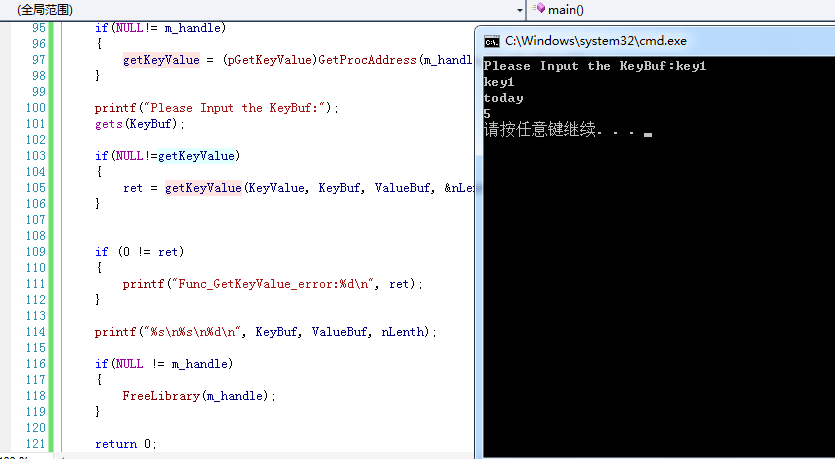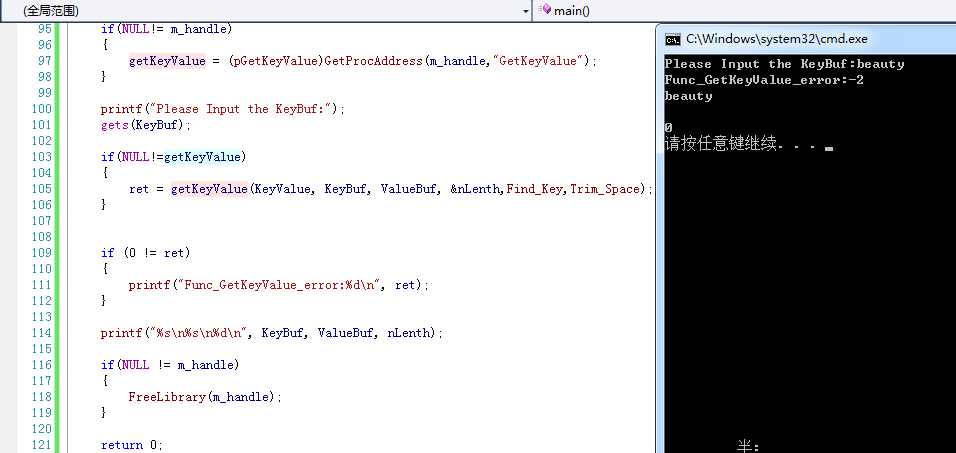1、首先了解一下回调函数的概念:
回调函数就是一个通过函数指针调用的函数。如果你把函数的指针(地址)作为参数传递给另一个函数,当这个指针被用为调用它所指向的函数时,我们就说这是回调函数。
2、为什么要使用回调函数呢?
因为使用回调函数,在编写代码时我们可以把调用者(主调函数)与被调用者(被调函数)分开。调用者不关心谁是被调用者,所有它需知道的,只是存在一个具有某种特定原型、某些限制条件(如返回值为int)的被调用函数。
这同特定原型,某些限制条件就是我们能够使用回调函数的根本。
3、回调函数在实际工程中的应用:
如果想知道回调函数在实际中有什么作用,先假设有这样一种情况,我们要编写一个库,它提供了某些排序算法的实现,如冒泡排序、快速排序、shell排序、shake排序等等,但为使库更加通用,不想在函数中嵌入排序逻辑,而让使用者来实现相应的逻辑;或者,想让库可用于多种数据类型(int、float、string),此时,该怎么办呢?可以使用函数指针,并进行回调。回调函数使用的比较多的还是基于动态链接库的调用,所以本文的例子就基于动态链接库来讲。动态链接库的知识点这里就不讲了,如果还有不知道动态链接库的,可以看在函数指针及其应用,动态链接库,正向调用 中查看动态链接库的相关应用。
4、回调函数的实际应用:
还是先看一下例子:
#include <stdio.h>
#include <stdlib.h>
#include <string.h>
#include <Windows.h>
typedef char* (__stdcall *FindKey)(const char (*KeyValue)[40] /*in*/, const char *KeyBuf /*in*/);
typedef int (__stdcall *TrimSpace)(const char *strInput /*in*/, char *strOut /*out*/);
typedef int (*pGetKeyValue)(const char (*KeyValue)[40] /*in*/, const char *KeyBuf /*in*/, char *ValueBuf /*out*/, int * ValueLenth /*out*/,\
FindKey findKey,TrimSpace trimSpace);
char *__stdcall Find_Key(const char (*KeyValue)[40] /*in*/, const char *KeyBuf /*in*/)
{
int i = 0;
char *pFind = NULL;
if (NULL == KeyValue || NULL == KeyBuf)
{
return NULL;
}
for (i = 0; i < 10; i++)
{
pFind = strstr(*(KeyValue + i), KeyBuf);
if (NULL != pFind)
{
return pFind;
}
}
return NULL;
}
int __stdcall Trim_Space(const char *strInput /*in*/, char *strOut /*out*/)
{
int i = 0;
int j = 0;
int nCount = 0;
int ret = 0;
if (NULL == strInput || NULL == strOut)
{
ret = -3;
return ret;
}
j = strlen(strInput)-1;
while (strInput[i] ==32)
{
i++;
if (32 != strInput[i])
{
break;
}
}
while (strInput[j] == 32)
{
j--;
if (32 != strInput[j])
{
break;
}
}
nCount = j - i + 1;
memcpy(strOut, strInput+i, nCount);
strOut[nCount] = '\0';
return ret;
}
int main()
{
const char KeyValue[10][40] = { "key1= today",
"key2 = is ",
"key3= a ",
"key4 = very ",
"key5= beautiful",
"key6= and ",
"key7=very",
"key8= important",
"key9= nice ",
"key10= day "
};
char KeyBuf[10] = { 0 };
char ValueBuf[40] = { 0 };
int nLenth = 0;
int ret = 0;
HANDLE m_handle;
pGetKeyValue getKeyValue = NULL;
m_handle = LoadLibrary(TEXT("Sort.dll"));
if(NULL!= m_handle)
{
getKeyValue = (pGetKeyValue)GetProcAddress(m_handle,"GetKeyValue");
}
printf("Please Input the KeyBuf:");
gets(KeyBuf);
if(NULL!=getKeyValue)
{
ret = getKeyValue(KeyValue, KeyBuf, ValueBuf, &nLenth,Find_Key,Trim_Space);
}
if (0 != ret)
{
printf("Func_GetKeyValue_error:%d\n", ret);
}
printf("%s\n%s\n%d\n", KeyBuf, ValueBuf, nLenth);
if(NULL != m_handle)
{
FreeLibrary(m_handle);
}
return 0;
}测试程序:

查找键 key1对应的键值为today,长度为5.
再次测试:

键beauty不存在,所以查找结果会返回一个错误。
这里讲一下上述函数实现查找的流程:
加载动态链接库:
m_handle = LoadLibrary(TEXT("Sort.dll"));
然后使用函数指针指向动态链接库中的函数:
getKeyValue = (pGetKeyValue)GetProcAddress(m_handle,"GetKeyValue");
调用动态链接库函数:这是最关键的一步。
ret = getKeyValue(KeyValue, KeyBuf, ValueBuf, &nLenth,Find_Key,Trim_Space);
然后在动态链接库中进行查找,动态链接库中需要findKey,以及 trimSpace,但是在运行的时候调用的实际上是我们自己写的函数:
char *__stdcall Find_Key(const char (*KeyValue)[40] /*in*/, const char *KeyBuf /*in*/)int __stdcall Trim_Space(const char *strInput /*in*/, char *strOut /*out*/)5、最后附上动态链接库的源代码:
#include "stdlib.h"
#include "stdio.h"
#include "string.h"
typedef char* (__stdcall *FindKey)(const char (*KeyValue)[40] /*in*/, const char *KeyBuf /*in*/);
typedef int (__stdcall *TrimSpace)(const char *strInput /*in*/, char *strOut /*out*/);
__declspec(dllexport)
int GetKeyValue(const char (*KeyValue)[40] /*in*/, const char *KeyBuf /*in*/, char *ValueBuf /*out*/, int * ValueLenth /*out*/,\
FindKey findKey,TrimSpace trimSpace)
/* keyValue 输入的键值表
****keyBuf 输入的键
****valueBuf 输出键对应的键值
****valueLenth 输出键值的长度
****findKey 查找键的函数
****trimSpace 去掉键值中包含的空格
*/
{
int j = 0,i=0;
int ret = 0;
int nCount = 0;
char *pFindKey = NULL;
char *strSource = NULL;
char strReturn[40] = { 0 };
if (NULL == KeyValue || NULL == KeyBuf || NULL == ValueBuf || NULL == ValueLenth)
{
ret = -1;
return ret;
}
strSource = ValueBuf;
pFindKey = findKey(KeyValue, KeyBuf);
if (NULL == pFindKey)
{
ret = -2;
return ret;
}
j = strlen(pFindKey);
for (i = 0; i < j; i++)
{
if (61 == pFindKey[i])
break;
}
pFindKey = pFindKey + i+1;
ret = trimSpace(pFindKey, strReturn);
if (ret != 0)
{
return ret;
}
nCount = strlen(strReturn);
strSource = strReturn;
while ((*ValueBuf++ = *strSource++) != '\0');
ValueBuf[nCount] = '\0';
*ValueLenth = nCount;
return ret;
}





















 882
882











 被折叠的 条评论
为什么被折叠?
被折叠的 条评论
为什么被折叠?








